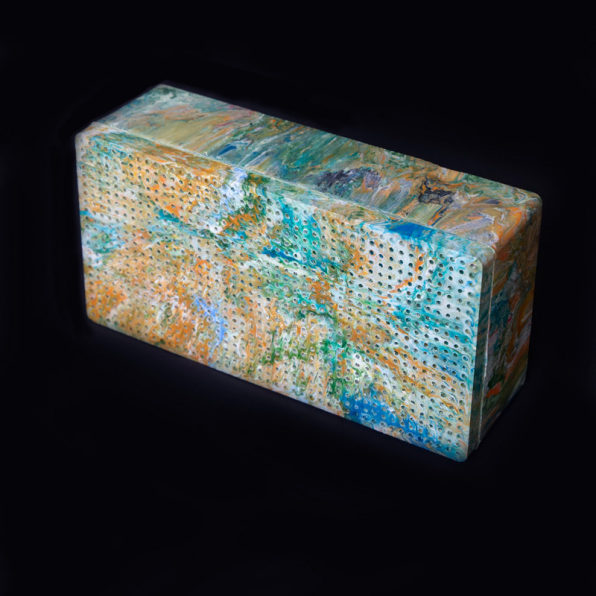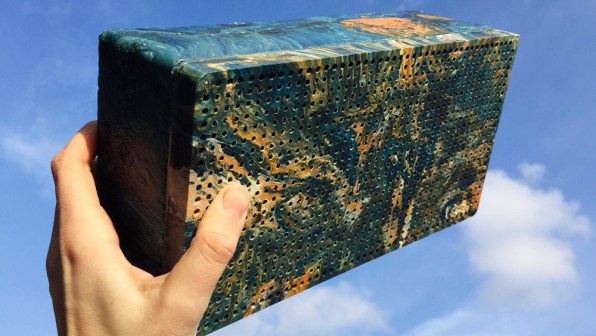Just take my money.
It’s rare that a Bluetooth speaker is truly distinctive. After all, it’s just a box with some holes. There’s only so much you can do! But the Gomi speaker is unusually gorgeous. It looks like the whole plastic box has been dipped into the swirling colors used to create marble paper.
In fact, the Gomi Speaker isn’t a product of painting at all. It’s actually produced by hand in Brighton, in the U.K., out of unrecyclable plastic that gets rejected by most recycling facilities. Each speaker is made of 100 plastic bags that are melted and squished together to create a high-tech, artisan product, instead of ending up in oceans or landfills. It’s part of a new wave of recycled plastic products that aren’t just as goodas products made from virgin plastics–but notably more desirable. Bespoke. Beautiful. And a buoy for the environment.

The Gomi Speaker is the result of research by the sustainable designer (and Gomi cofounder) Tom Meades. Operating largely thanks to an $11,000 grant from the nonprofit Environment Now Programme, he’s developed a process that repurposes plastic waste as speakers.He begins by collecting “flexible plastics,” like bags of all shapes, sizes, and colors. “Flexible plastics are deemed as non-commercially valuable to nearly all recyclers due to having no weight and being hard to process. So they are not recycled and have no economic value to the recyclers,” says Meades. “The flexible plastic waste we use would have 100% ended up in landfill, the ocean or be incinerated if we didn’t intercept and rescue them.” It takes a lot of bags to make a speaker, as over one pound of plastic goes into each unit.

Meades has developed a process that heats the plastic bags up just enough to make them malleable, but not so much that they release toxic gases into the air. The resulting goop looks like a cross between marble and chewing gum. Each batch is hand-swirled so the colors intertwine with catching veining. Then, it’s pressurized in a mold, which solidifies the material.This artisan treatment of repurposed plastic is on trend. The architecture and design firm Snøhetta recently developed a chair made from broken ocean nets that can be mass-produced in injection molds. Along the same lines, several companies have experimented with turning discarded glass into fetching terrazzo for furniture and tableware–or even LEED-certified flooring–with the help of composite binders. In each case, these objects, despite being mass-produced, each come out with unique patterning. Because of the nature of reclaimed materials, no two are alike.
“We’ve tried to create a connection between a user and a product that the user knows they have a one-of-a-kind speaker for themselves to treasure and hopefully never throw away as waste,” says Meades. And if the Gomi does ever break, it can actually simply be reheated and molded into a new speaker. When repurposed waste is the construction material, an object should never need to become garbage again.

The Gomi Speaker will be on Kickstarter starting on February 26, priced at $225. Only 500 will go on sale, but the company will also be offering a portable and wireless phone charger as well. As it launches more products, Gomi wants to create its own circular economy.
“It’s a lot of work to collect the raw waste plastics, so it will be easier for us to make products out of old products we made rather than hunting for new material,” says Meades.
It’s a brilliant plan–and it’s actually similar to the way Apple is thinking these days as it reconsiders how it builds new iPhones and treats old devices. But of course, there’s one big difference: Apple builds phones out of rare earth materials. Gomi builds them out of literal trash.
–
This article first appeared in www.mediapost.com
Seeking to build and grow your brand using the force of consumer insight, strategic foresight, creative disruption and technology prowess? Talk to us at +9714 3867728 or mail: info@groupisd.com or visit www.groupisd.com


![[Photo: Gomi]](https://images.fastcompany.net/image/upload/w_562)

